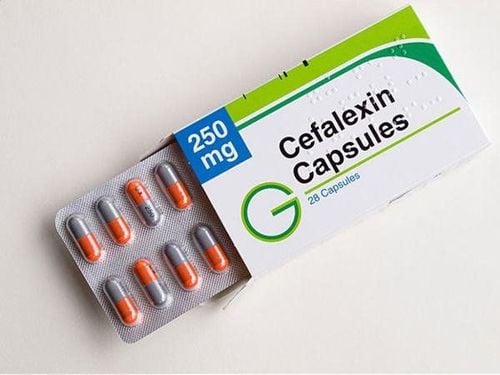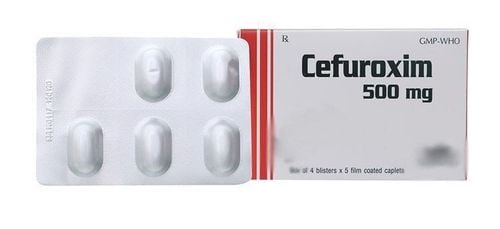This is an automatically translated article.
Midanat 100 belongs to the 3rd generation Cephalosporin antibiotic group, indicated in the treatment of mild to moderate infections with strains of bacteria susceptible to Cefdinir in children. The following article provides readers with information about the uses and possible notes when using Midanat 100.
1. What is Midanat?
Midanat medicine contains the main ingredient Cefdinir, which is prepared in the form of a powder for oral suspension with a strength of 100mg.
Cefdinir is a semi-synthetic antibiotic, belonging to the 3rd generation Cephalosporin group. Cefdinir contains a cephem nucleus, with a vinyl group at the 3rd position and a 2-aminothiazoly hydroxyimino group at the 7th position of 7-aminocephalosporanic acid.
Cefdinir has a bactericidal effect by inhibiting bacterial cell wall synthesis. The drug has a high affinity for penicillin-binding protein (PBP) 1 (1a, 1bs), 2 and 3, with points of action that vary with the organism.
The drug is not affected by beta-lactamase enzymes produced by Gram-negative and Gram-positive bacteria. Many bacteria are resistant to penicillin and some cephalosporin antibiotics but are still susceptible to cefdinir. The following strains of bacteria are susceptible to Cefdinir:
Gram-positive aerobic bacteria: Staphylococcus aureus (including beta-lactamase-producing strains, but not active against methicillin-resistant staphylococcus), Streptococcus pneumonia (including strains of methicillin-resistant staphylococcus aureus) penicillin-sensitive), Streptococcus pyogenes. Gram-negative aerobic bacteria: Haemophilus parainfluenzae, Moraxella catarrhalis, Haemophilus influenzae. Gram-positive anaerobes: Staphylococcus epidermidis, Streptococcus agalactiae, Viridan group streptococcus. But Cefdinir is not effective against Enterococcus and methicillin-resistant Staphylococcus strains. Gram-negative anaerobes: Proteus mirabilis, Citrobacter diversus, Klebsiella pneumonia, Escherichia coli. But Cefdinir is not effective against strains of Pseudomonas and Enterobacter.
2. Indications and contraindications for Midanat
Midanat medicine is indicated in the treatment of mild to moderate infections of Cefdinir susceptible strains of bacteria in children in the following cases:
Acute bacterial otitis media. Acute maxillary sinusitis. Sore throat. Tonsillitis . Uncomplicated skin and skin tissue infections. Midanat is contraindicated for use in the following cases:
Hypersensitivity to Cefdinir, Cephalosporin antibiotics, Penicillin or any other ingredient in Midanat.
3. How to take Midanat
Midanat drug is taken orally, taking the drug according to the doctor's instructions.
Antibiotics, including Cefdinir, work most effectively when drug levels are maintained at a stable level. Therefore, cefdinir should be administered at equal intervals.
Take Cefdinir until the full prescribed dose is finished, although symptoms may improve after a few days of taking the drug. Stopping Cefdinir too soon can cause the bacteria to continue to grow, leading to a recurrence of the infection.
Recommended dose of Midanat: Children from 6 months to 12 years: Dosage 14mg/kg/day. Maximum dose: 600mg/day.
Acute bacterial otitis media: Dosage 7mg/kg/time x 2 times/day, use the drug for 5-10 days or 14mg/kg/time/day for 10 days. Acute maxillary sinusitis: 7mg/kg/time x 2 times/day, use the drug for 5-10 days or 14mg/kg/time/day for 10 days. Pharyngitis, tonsillitis: 7mg/kg/time x 2 times/day, use the drug for 5-10 days or 14mg/kg/time/day for 10 days. Uncomplicated skin and skin tissue infections: 7mg/kg/time x 2 times/day, used for 10 days. Patients with renal impairment: Children with creatinine clearance < 30ml/min: Dosage 7mg/kg/time/day (maximum dose 300mg).
Patients on hemodialysis: The starting dose is 7mg/kg/dose every other day in children.
Cefdinir is partially eliminated by hemodialysis, therefore, at the end of a dialysis session, an additional dose of 7 mg/kg should be given in children and a subsequent dose every 2 days.
Midanat overdose and management:
There is no information on overdosage of Cefdinir in humans. Symptoms of toxicity after overdose with other beta-lactam antibiotics include: epigastric pain, nausea, vomiting, diarrhea and convulsions. Cefdinir can be removed from the body by dialysis, especially in patients with renal failure. Some cephalosporin antibiotics have been associated with inducing seizures, particularly in patients with renal impairment who have not been dosed. If seizures occur during the use of Midanat, the drug should be discontinued. Anticonvulsants can be treated if clinically indicated. What to do if you miss a dose of Midanat:
If you forget to take a dose of Midanat, take it as soon as possible. If it is almost time for the next dose of Midanat, skip the missed dose and take the next dose as scheduled. Also, do not double the dose of Midanat.
4. Midanat . side effects
Unexpected effects when using Midanat:
Common: Candida skin infections, skin rashes, vaginal yeast infections, diarrhea, digestive disorders, headache, nausea, vomiting . Uncommon: Abdominal bloating, dyspepsia. Rare: Anaphylaxis, toxic epidermal necrolysis, Stevens–Johnson syndrome, leukopenia, acquired hemolytic anemia, decreased renal function, Clostridium difficile diarrhea, erythema multiforme , convulsions, hearing disorders, constipation, trouble sleeping, dizziness, dry mouth, itching. When experiencing any serious side effects, it is necessary to stop using Midanat and notify your doctor for timely treatment.
5. Notes when taking Midanat
The safety and effectiveness of Cefdinir use in children younger than 6 months of age have not been established. Midanat should be used with caution in patients with a history of hypersensitivity to cephalosporin or penicillin antibiotics. Prolonged treatment with Midanat may lead to the emergence of resistant strains of bacteria. Midanat should be used with caution in patients with a history of colitis. Patients with impaired renal function: Midanat should be used with caution. If creatinine clearance is <30ml/min, dose reduction is required. Pregnancy: The safety of Cefdinir in pregnant women has not been established. Therefore, caution should be exercised when using Midanat in this population. Lactation: It is not known whether Cefdinir is excreted in human milk, therefore Midanat should only be used when clearly needed.
6. Drug interactions
Iron-containing drugs or antacids: When used concurrently reduces the absorption of Cefdinir. Therefore, if necessary, Cefdinir should be taken 2 hours before or after these drugs. Probenecid: Reduces renal excretion of Midanat. Midanat is a prescription drug for the treatment of mild to moderate infections with strains of bacteria susceptible to cefdinir in children. Care should be taken to adjust the dose of Midanat 100 in patients with impaired renal function. To use Midanat safely and effectively, it is necessary to give the medicine to the child exactly as prescribed by the doctor.













